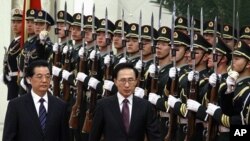China is welcoming South Korean President Lee Myung-bak, for a three-day visit aimed at highlighting bilateral ties and discussing the future of the Korean peninsula following last month's death of North Korean leader Kim Jong Il.
Chinese President Hu Jintao formally welcomed his South Korean counterpart to Beijing Monday. Chinese Foreign Ministry spokesman Liu Weimin says China sees the South Korean leader's visit as important.
He says China and South Korea are important neighbors and have established what he described as "a strategic cooperative partnership". He also pointed out that China has become South Korea's top trading partner.
Cai Jian, the deputy of the Center for Korean Studies at Shanghai's Fudan University, says he thinks the timing of the visit is significant.
Cai says he thinks Sino-South Korean relations may benefit from North Korean leader Kim Jong Il's recent death because, in his words, “it will give the two countries more space for cooperation” on the common goal of maintaining stability on the Korean peninsula.
For decades, China has been one of North Korea's closest diplomatic allies. Cai says another reason for mutual political distrust between Beijing and Seoul has to do with the Chinese government's feeling that South Korea's alliance with the United States threatens China's interests.
He says China thinks South Korea seems to support and follow the United States more than it does China and tends to take the U.S. position in regional disputes. He says China sees this type of alliance as having the potential to disrupt the balance of power in the region.
The Chinese government spokesman says the two sides share an interest in maintaining peace and stability on the Korean peninsula and in speeding the resumption of the six-party talks aimed at persuading North Korea to give up its nuclear weapons.
China hosts the talks, which also include officials from the United States, North Korea, South Korea, Japan and Russia. The talks have been stalled since 2009, but the Chinese spokesman referred to “new momentum” for Beijing and Seoul to “enhance contact” with an ultimate aim of restarting them as soon as possible.
The South Korean leader is set to meet with China's top legislator Wu Bangguo and Premier Wen Jiabao, and attend a meeting with South Korean business leaders in China, before leaving Wednesday.




